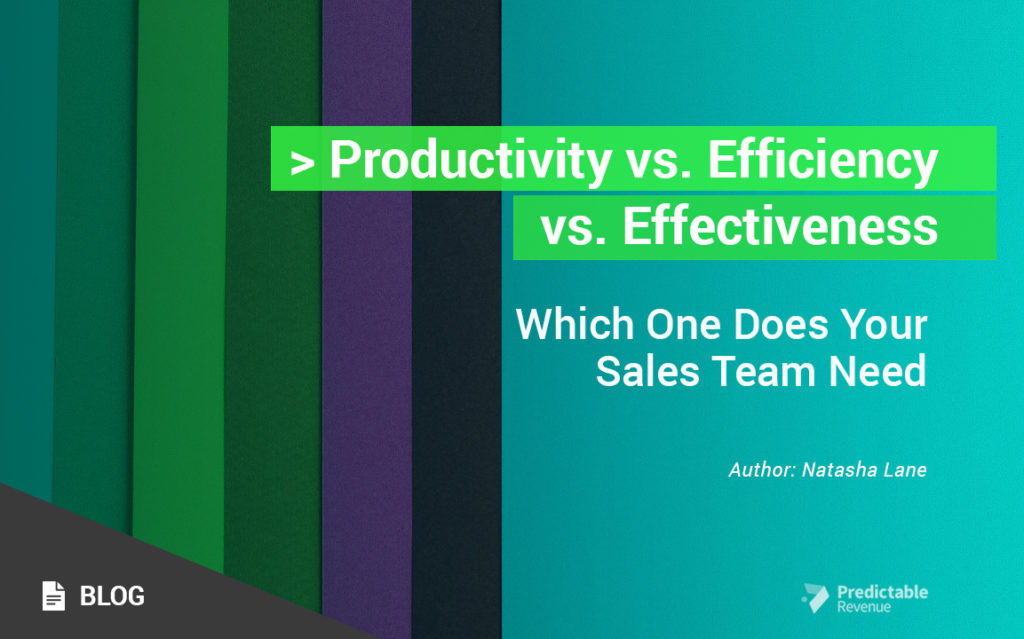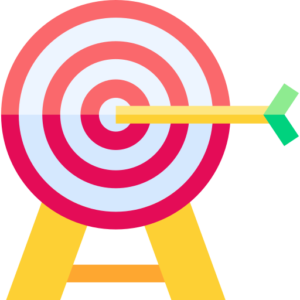Productivity, Efficiency or Effectiveness: Which One Does Your Sales Team Need?

Author: Natasha Lane
There’s a lot of talk about productivity, efficiency, and effectiveness among business leaders.
Most often, the terms are used interchangeably. And for the most part, that doesn’t pose as a problem, as all three areas of input optimization benefit your organization. But do the three terms stand for the same thing? Well, that’s where things start to require a little bit more precision.
If you’re after a general improvement in your bottom line, then what you care about aren’t details. You just want results. And that’s perfectly fine.
However, if you’re looking to scale your operations, then you might want to take a closer look at the terminology.
What does each of these words mean? How can you benefit from productivity, efficiency, or effectiveness? Which of the three does your sales team need? You’ll find the answers to these questions below.
What is the difference between efficiency, effectiveness, and productivity?
To understand the differences between the three terms (efficiency, productivity, and effectiveness), we must first know their exact meanings. According to the Cambridge dictionary:
Productivity stands for “the rate at which a company or country makes goods, usually judged in connection with the number of people and the amount of materials necessary to produce the goods.”
Efficiency means “the good use of time and energy in a way that does not waste any.”
Effectiveness is “the rate to which something is effective (i.e., successful at achieving the results you want).”
Productivity vs effectiveness vs efficiency
So, it turns out that the three terms actually stand for distinctly different things.
While productivity is simply the correlation between input and output, efficiency denotes doing things well enough.
Effectiveness, however, stands for doing the right things.
Which One Does Your Sales Team Need?
The easy answer would be to say that you need to focus your attention on one of the three aspects of successful work. However, boosting sales is never that simple. So, instead of looking at just one area of your business, why not aim to make improvements over the board?
It may seem like a lot of work maximizing productivity, efficiency, and effectiveness at the same time. However, it’s far from impossible. Yes, it takes effort. But, it also ensures that your sales team is doing all the right things to bring in revenue. Ideally, once your sales are optimized, you’ll have said goodbye to unnecessary spending or time-wasters that have no long-term value.
Identifying Hindrances to Sales Team Performance
The best way to boost your sales team’s performance is to look at how they’re currently doing. Chances are, you’re likely to find at least one or two areas in which there’s room for improvement. This may seem like a lot of work (or even a waste of time), but rest assured that analyzing input and achievements makes for the best possible tool in increasing revenue.
1) Start with Time-Tracking
For the most part, business owners fall into one of two categories. Some see employee time-tracking as a way to maintain control over their team’s performance. Others feel that the practice is too intrusive and a hindrance to a trusting business relationship. In truth, time-tracking doesn’t have to be either. When used correctly, it can actually be a powerful mentorship tool.
There’s a multitude of time-tracking apps available for download. But, to get the most out of a time-tracking app, make sure that your team uses a powerful calendar app that allows multiple integrations. Once you’ve got the data, you can analyze each assignment and see how it affects your team in terms of necessary input and ROI. You might just be surprised at the results of what brings in the best outcomes.
2) Know Your Customers’ Behavior
The best way to maximize your sales team’s efforts is to know how your customers respond to them. For e-commerce (or any other website), that’s relatively easy to do with Google Analytics. With the right implementation, this tool can tell you what you’re doing right and which of your pages still need improvement.
However, if you’re really prepared to take things a step further, then you’re going to need a powerful CRM tool like Salesforce. While there’s a learning curve to getting the most out of such apps, rest assured that they’re of the best ways to boost productivity, efficiency, and effectiveness at the same time.
3) Identify Areas for Improvement
Once you have a clear idea of what your team is doing, as well as insights into how your customers are responding to their efforts, you can go on to identify areas for improvement.
Perhaps you’re putting too much energy into one sales channel and not enough into another? Perhaps your messaging isn’t tailored to your customers’ position in the sales funnel? If you’re ready to lead them to the next level and address productivity, efficiency, and effectiveness at the same time, you’ll need to take a critical stance.
3) Implement Beneficial Practices
Now that you have a clear idea of what requires improvement to boost commerce, you can choose the best solutions for your sales team’s needs. For some businesses, this will be automation that promotes productivity and efficiency. For others, it will be a change in sales and marketing channels to tackle effectiveness. Some business owners may even find that cutting down on work hours (and providing more time for rest) has positive effects on the number of errors employees make.
Final Thoughts
As you can see, improving your sales team’s performance isn’t just about maximizing productivity. In the end, increased input for an increased output won’t give you the results you’re truly after. To really maximize sales, you also need to think about both efficiency (doing things as well as possible) and effectiveness (focusing on the right actions).
So, make sure to study your employees’ performance. Identify how you can help them do better. More often than not, boosting sales won’t require them to work harder. Instead, it will mean being smarter about how their energy is invested.
Natasha is a growth hacker, lady of a keyboard, and one hell of a geek. She is always happy to collaborate with awesome blogs and share her knowledge about business growth and digital marketing trends. To see what she is up to next, check out her Twitter feed.
Experience and a lot of testing have shown us that it is possible to create email templates that people actually resonate with.
You don’t have to figure it out alone, whether you’re starting off as a sales representative, looking to improve your game or providing your team with expert advice, we have your back!
Ready to scale your sales but not sure where to start? Discover how our Scaled Fractional SDRs can amplify your team’s potential and drive growth. Get started NOW!
